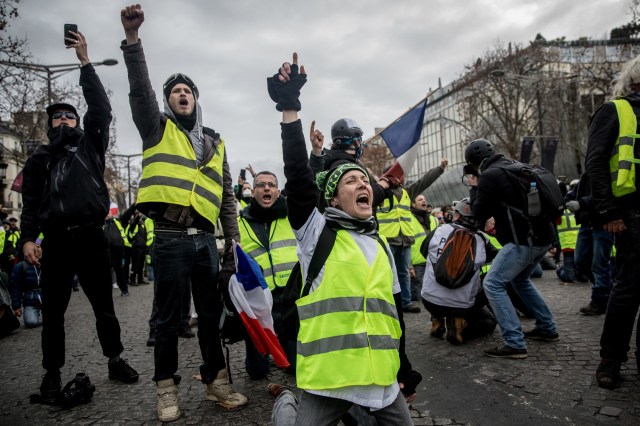(Credit: Chris McGrath/Getty Images)

There is one book which should be compulsory reading in France this Christmas. Although published in May, Who Killed My Father prophesises the “yellow jackets” phenomenon which threatens to overwhelm France’s democratic institutions.
The author, Edouard Louis, is 26 years old. His first successful book, The End of Eddy, published in 2014, was translated into 20 languages. Although classified as a “novel”, it was not truly a work of fiction.
The book was a laconic, bleak, sometimes lyrical description of the life of a young, gay man growing up in a violent, drunken, racist and gay-hating, working class family in post-industrial northern France. The young man, the Eddy Bellegueule (‘Eddy beautifulface’) of the original French title, was Edouard Louis himself.
His latest book, Qui a tué mon père, can be read as an apology for the first. It describes the struggles for survival and self-respect of his father – a factory worker forced to work as a cleaner after an industrial accident.
This short book – 76 pages in the original French – describes the love-hate relationship between a drunken, gay-baiting, blue collar father and an effeminate son. It also accuses by name a series of French politicians, from Jacques Chirac to Emmanuel Macron, of making brutal decisions which devastated the life of the father and, by extension, all people who live on the periphery of thriving metropolitan France.
In both books, Louis makes it clear that, as a child and as young man before he escaped to the gay and literary scene in Paris, he feared and detested his papa. “As a child I used to pray as I came home from school, let him not be there, let him not be there, let him not be there.”
As the short book progresses, it becomes a Zola-like catalogue of accusation against a supposedly heartless French state and cuts in its welfare system. Louis’s father suffered a serious back injury at work but was forced to take a job as a cleaner on Euros 700 a month by welfare reforms imposed by Nicolas Sarkozy. “Nicolas Sarkozy broke my father’s back,” Louis writes.
Emmanuel Macron introduced a five euros a month cut in benefits last year which was tiny but important to his father. “Macron thinks that the poor are too rich and the rich are not rich enough,” Louis writes. “Macron took the food out of your mouth.”
Some of this is absurd. The French welfare system remains one of the most generous in the world. Louis’s success as a writer means that he is now part of the thriving metropolitan world which the yellow vest rebels despise. The book reads, in part, as a cry of guilt by a man who escaped a life of brutal poverty but does not want to be accused of despising the people that he left behind.
The book is compelling all the same. It powerfully conveys the rancour and sense of injustice of the peripheral, struggling France which spawned the gilets jaunes movement. It also explains the extreme violence of some of the protests.
In all his works Louis describes the everyday brutality of the village in the northern Somme department where he grew up. Of his mother, he says: “You never called violence violence. You called it life.”
But the best book published in France last year is by Philippe Lançon, and would not have been published in Britain or the United States. It defies all publishers’ categories and expectations. Hence, its brilliance.
Philippe Lançon, a journalist and writer, was one of the few people to survive the jihadist attack on the satirical magazine, Charlie Hebdo in January 2015. His jaw and lower face were smashed by bullets. He spent 10 months in hospital and endured 17 operations to reconstruct his face.
His book, Le Lambeau, ‘the rag’, is also a reconstruction. It describes in a controlled jumble of lengthy digressions the author’s life and career up to the attack; his visit to the theatre the night before; life at Charlie Hebdo; the attack itself and his long months in hospital.
The effect is to wire the reader into the stream of consciousness of a man lying in a hospital bed. Extraordinary.
To read more of John Lichfield’s reporting on the gilets jaunes, click here










Join the discussion
Join like minded readers that support our journalism by becoming a paid subscriber
To join the discussion in the comments, become a paid subscriber.
Join like minded readers that support our journalism, read unlimited articles and enjoy other subscriber-only benefits.
Subscribe